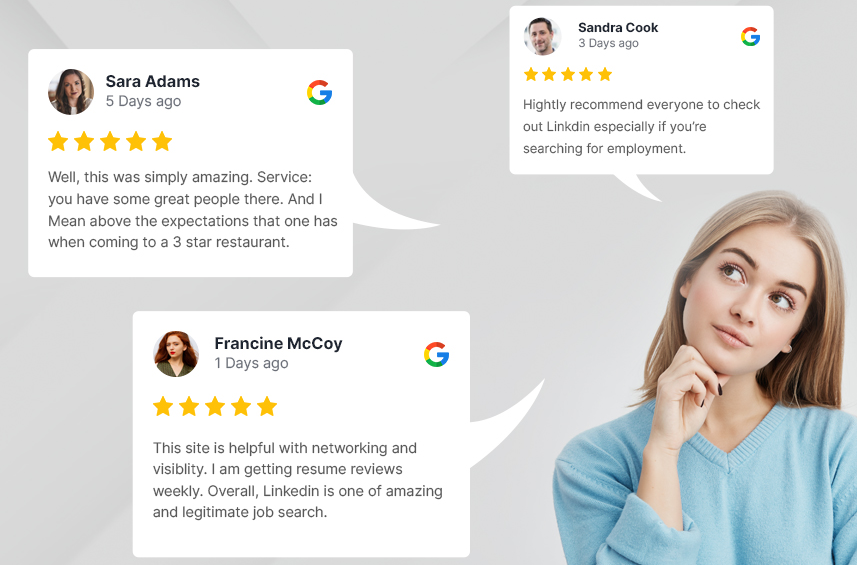Jul. 12
How reputation management affects purchasing power?
Reviews and ratings have an incredible power of persuasion.
When a consumer chooses a product, reviews are the first thing they pay attention to after the price. Mainly it refers to new customers. For them, reviews are an indicator that a brand can be trusted.
85% of consumers are just as receptive to reviews as to personal recommendations.
The other issue is negative reviews. For some reason, people are willing to leave negative reviews than positive ones. And because of that, 60% of consumers refuse to purchase, seeing many negative reviews.
So let’s figure out the connection between reputation management and purchasing
It’s indeed a fact that the overall presence of reviews has an impact on conversion rate. Consider this as a social endorsement of a product or business. If a product has reviews, the possibility of purchasing it increases three times.
The same relates to how many stars a business has. The rule is pretty simple: the more stars (closer to 5), the higher the conversion rate.
The surprising thing about the high star rate is that consumers would rather buy a product with 4-4,7 stars than 5 stars because a higher rating seems overpriced and not credible.
A review is a qualitative assessment, and a rating is quantitative. It is enough to look at the evaluation, and everything is clear. Comments must be read. However, they are more advanced.
Before contacting a company, a customer goes through an average of 10 reviews. And if they are positive, we can assume that the client will proceed to purchase. Conversely, negative comments can cost a business a dozen lost customers and a lower star rating.
Your brand doesn’t have reviews?
Suppose your business doesn’t have reviews at all. In that case, you should consider using a reputation management service that automatically sends notifications or emails to encourage customers to leave a review after purchasing. Or the most straightforward way would be to ask customers directly, and according to statistics, 70% of them will leave a review if you ask.
Having reviews is suitable for brand recognition. Especially they’ll work the best way for your brand reputation if they’re:
– personal – written on behalf of a real person;
– contain a link to social networks or other proof of authenticity;
– contain photographs – as proof of the fact of purchase;
– contain an indication of jambs;
– be extended, but moderately;
– contain video – for example, unpacking or pointing out flaws.
What about bad reviews?

Three words. Don’t ignore them! Ignoring negative reviews will affect your company name in the worst way.
Generally, people who leave negative reviews just want their point of view has been seen. And if you comfort them and give an answer that resolves their problem, customers will likely buy from you again.
Moreover, answering negative reviews regularly can also improve the star rating of your brand. Show that you care by responding to your customers’ reviews. This will also bring more customer reviews in the future, which is good for the brand’s online reputation.
Often people try to distance themselves from the author of a bad review and try not to be like him or pay attention to them. For example, if package difficulty is indicated as a minus, a buyer with good skills will not perceive such a review as repulsive and will order without hesitation.
The most trusted reviews are from those with a “verified buyer” mark next to the review. A verified buyer means this is a real person who bought a product and confirmed his identity, and thus, a brand can affirm he can be trusted. Furthermore, such buyers are likelier to leave positive reviews so the average rating will be higher.
Responding to positive reviews is as essential as to negative ones.

Your customer response is crucial even if your brand has a high star rating and many positive reviews. In fact, you should encourage existing customers to share your brand with everyone else.
There are many ways to ask customers for detailed feedback. Here are a few obvious ones:
- Respond to posted responses on behalf of the company. Show that real people are on the side of the company. Be useful.
- Give bonuses for an answer – a discount, a promo code, or a souvenir.
- Send messages asking you to rate the collaboration.
- Use creative appeals.
- Encourage leaving reviews on social networks.
- Bonus for a recommendation on social networks or a specific person.
- Run a contest for the best review.
- Place a sticker with a QR code “Leave your review.”
Apply reviews to the website.
Allow customers to filter reviews by date, rating, photo, and video. The ability to read only the most recent comments, or only negative ones, will be in demand.
Pay attention to the display of visual content. Users unpacking photos and videos should be visible on the site. You can place them in a separate block.
And again, your response to customer feedback is always welcome. Thank them for good reviews, solving problems, and commenting on exciting ideas. About half of the reviewers expect company feedback, which works for customer loyalty. Use AI and machine learning. The algorithm can process all the reviews on the site and highlight the most important ones for the user.
Give users the best possible usability for writing reviews. They don’t want to waste time looking for the right button in the middle of nowhere. Display products with the highest rating and number of reviews on the main page. Focus on promoting them.
Reviews from the perspective of SEO.

Let’s look at the key benefits:
- Customer reviews are the perfect option to increase unique content on product pages and improve overall website ranking;
- As you know, reviews form a company’s star rating, which, in turn, is one of the important ranking factors in local search. The number of stars determines how often your brand will appear at the top of local search results (Google Local Pack) or organic results compared to your competitors, giving you the absolute edge in generating leads;
- Growth of clicks on low-frequency searches. Meaning when a person searches the name of your product + its reviews, this positively affects the increase of search traffic in the search results.
Such seemingly small moments positively impact the online store as a whole, contributing to the growth of the targeted traffic and hence the growth of sales.
Start making your brand recognizable
Reputation management is nowadays PR. Digital marketing is growing and changing, and now it’s not only the click-through measurement process, etc.
Brand reputation is one of the most critical values every business owner should pay significant attention to.
Working with reviews and reputation ensures customer loyalty and can increase conversion to points of sale, promote SEO and, as a result, affect the growth of profits.
With the help of feedback, you will understand how your product or service works, the disadvantages, and what users want. You will then improve the product or service and refine it to meet customer expectations.
Always engage your customers. Such a method will make your brand trustworthy, and with this approach company’s sales and profits will increase.
1MDE specializes in reputation management and will help to make the brand more recognizable and customers more loyal.
Let’s make your brand relatable. Get your free proposal now!
Similar articles






